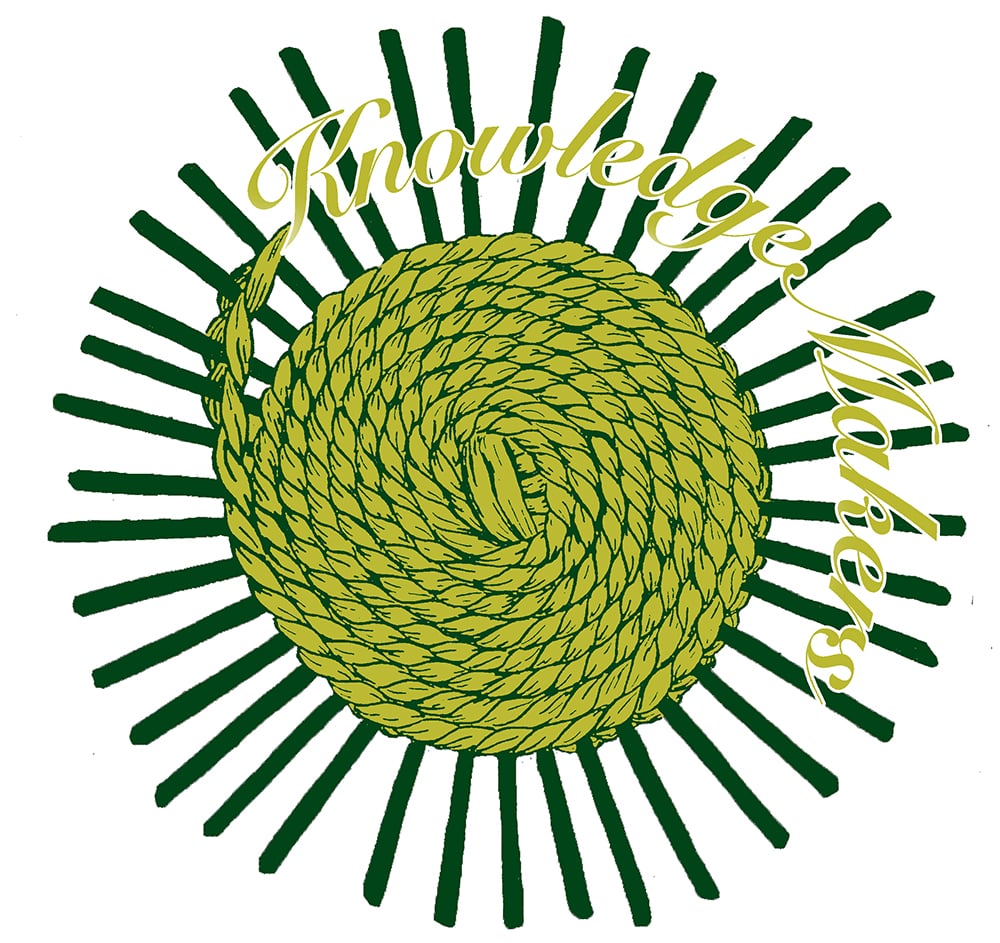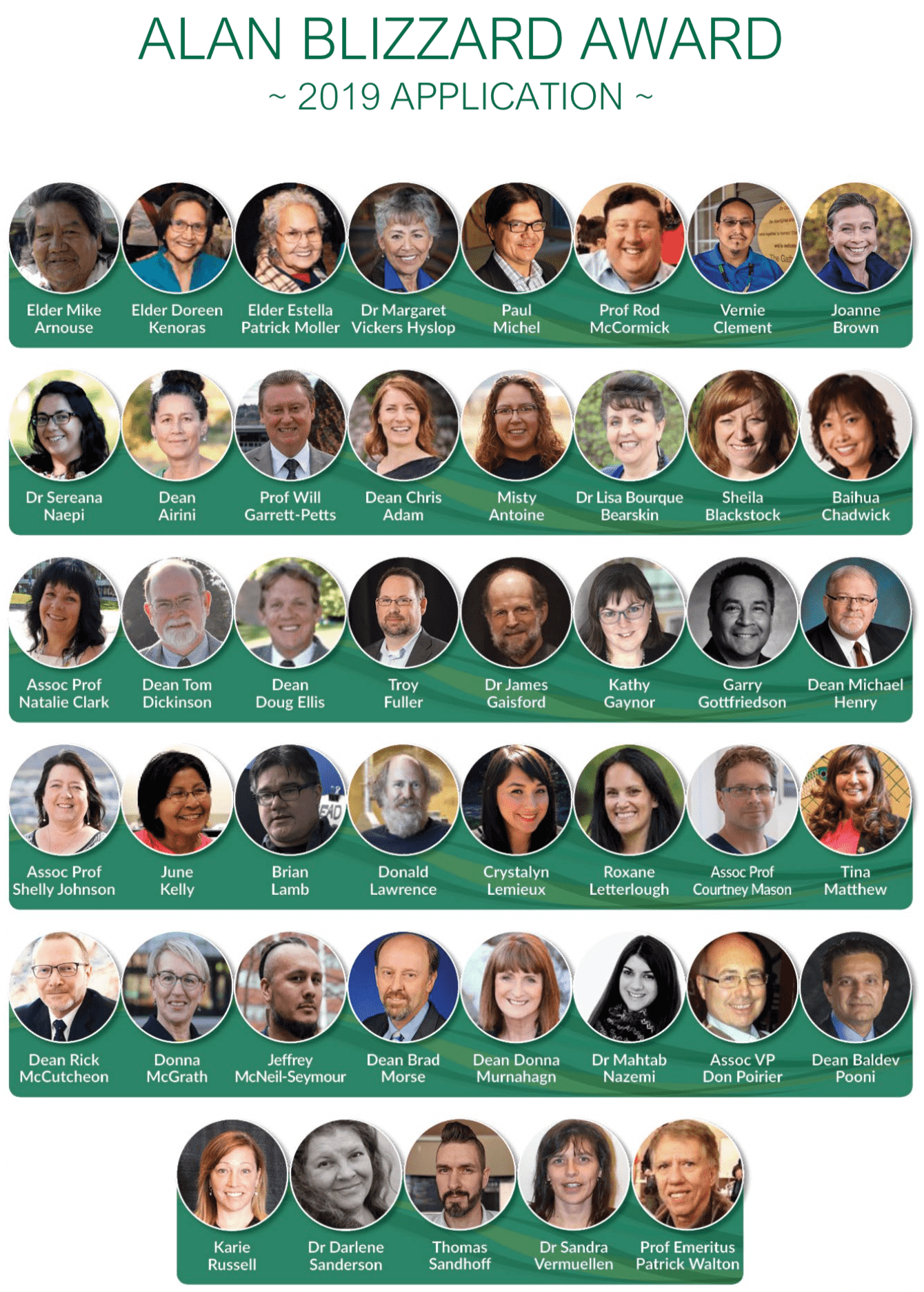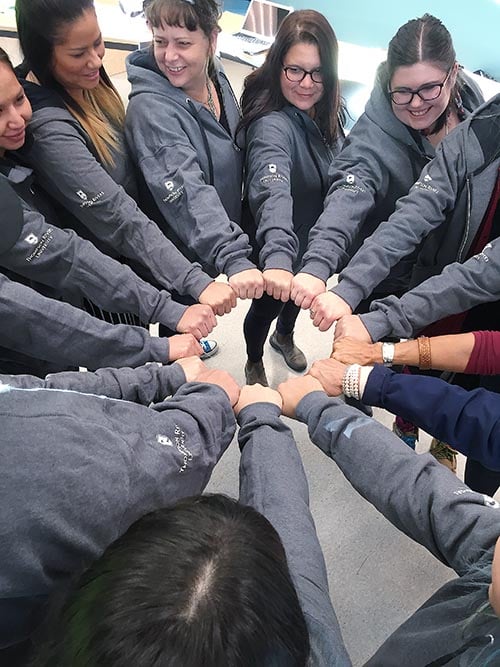About
The Knowledge Makers symbol
The symbol of Knowledge Makers is the traditional Secwepemc Nation craft of the pine needle basket. Knowledge Maker (2016) Levi Glass created this symbol to incorporate two elements: that Knowledge Makers is both about the many generations of Indigenous knowledge that came before us, and that our work together is weaving a future generation of Indigenous researchers.

Knowledge Makers outcomes
Knowledge Makers is a collaborative teaching initiative where Indigenous students learn how to research, and how to publish research, as Indigenous researchers. Based at Thompson Rivers University, we bring together up to 15 Indigenous undergraduate students each year from across the university to learn how to ‘make knowledge’ through a multi-modal approach.
Outcomes since 2015 include:
- Indigenous students from more than 30 bands and nations, have completed Indigenous interdisciplinary research mentoring and published their first reviewed journal article.
- Knowledge Makers Journal published articles.
- Knowledge Makers alumni include: Two national scholarships winners, SSHRC research grant ($50,000), 15 research assistants, six graduate research scholarships, four continued to masters, one international internship, two post-baccalaureate studies, one awarded a mainstream undergraduate research grant (TRU), two presented at the International Indigenous Research Conference (November 2018).
- Knowledge Makers Indigenous researcher mentoring circles established at undergraduate, graduate and doctoral level.
- Knowledge Makers five-nation international mobility network: Canada, United States, Mexico, New Zealand and Australia.
National Teaching Excellence Award

In 2019 Knowledge Makers was awarded Canada's only award for excellence in collaborative teaching in post-secondary education: The Alan Blizzard Award.
Knowledge Makers is about growing Indigenous researchers, beginning at the undergraduate level. A network of 42 members plus supporters at TRU have taken steps to expand Indigenous student research significantly. It includes four Indigenous Elders, the executive director of the Office of Indigenous Education, all nine TRU deans and leadership from Open Learning, the TRU library and TRU World.
This TRU initiative is led by Dr. Sereana Naepi (Associate Director, All My Relations Research Network: sepatterson@tru.ca).
“We approached the award process humbly but intentionally. We believe in the need for Indigenous-led research. The Knowledge Makers team has been recognized for this award—Canada's only team-teaching excellence award — which is granted once every two years.
“It is our hope that colleagues across Canada may be encouraged to also develop programs in support of Indigenous research and researcher advancement. We look forward to sharing with them and continuing to walk this journey together.”
For 2019 there were the highest number of applications ever for the award. STHLE recognized the Knowledge Makers at an award ceremony in Winnipeg in June. The Alan Blizzard Award highlights excellence in collaborative teaching and learning in post-secondary education.
The award was established in 2000 to encourage, identify and publicly recognize those whose exemplary collaboration in teaching enhances student learning. The award honours Dr. Alan Blizzard, STLHE president from 1987 to 1995, and his convictions about the effectiveness of collaboration in team teaching for student learning. The award seeks to make visible and disseminate scholarship of teaching and learning, based on the values and practices of collaborative teaching.
Publications about Knowledge Makers

Articles
- Naepi, S. (2019). Knowledge Making: Indigenous Undergraduate Research as Cultural and Language Revitalization. Canadian Journal of Native Education, 41(1), 85-102.
- Naepi, S. and Airini. (2019). Knowledge Makers Increasing Indigenous Student Engagement. Scholarship and Practice of Undergraduate Research, 2(3), 52-60.
- Scherer, M. (2016). The importance of research and the value of Knowledge Makers. Knowledge Makers, 1, 58-62.
Chapters
- Airini., and Naepi, S. (2018). A Notch in my Heart: University practices that help Canadian first-generation student success. In Bell, A. and Santamaria, L. (Eds), Understanding Experiences of First Generation University Students: Culturally Responsive and Sustaining Methodologies, Bloomsbury Publishing, London.
Presentations
- Naepi, S. (2019). Knowledge Makers Reconnecting with Indigenous Research Practices. Thompson Rivers University. Environmental Sciences Seminar.
- Airini., and Naepi, S. (2019). Knowledge-Makers: Increasing Indigenous Student Undergraduate Researchers and Research Through Multimodal Practices, American Educational Research Association, Toronto.
- Naepi, S., Airini., Sandy, M. and Fredborg, A. (2019). Knowledge Makers: Building Indigenous undergraduate research capacity. International Indigenous Research Conference, Auckland, New Zealand.
- Naepi, S., Airini., Scherer, M. and Chillihitzia, M. (2017). Knowledge Makers, Awakening the Spirit Conference, Vancouver, Canada.
Publications by Knowledge Makers
- Aird, M. (2016). Mandatory Indigenous studies at Thompson Rivers University. Knowledge Makers, 1, 8-13.
- Aird, M. (2017). Knowledge Makers: A stepping stone toward Indigenous student success. Knowledge Makers, 2, 70-73.
- Archie, G. (2018). The best ideas have come from research into our own selves. Knowledge Makers, 3, 23-25.
- Arnouse, K. M. (2017). A critical analysis of the relationship between Indigenous populations of Canada and social workers: Historically, comtemporarily, and in the future – from the perspective of an Indigenous (future) social worker. Knowledge Makers, 2, 37-44.
- Bandura, S. (2019). TRU Warriors of Knowledge. Knowledge Makers, 4, 9-19.
- Boisclair, K. (2017). Creating a voice: Connecting art, cultural identity, and suicidality in Indigenous adolescents. Knowledge Makers, 2, 14-18.
- Casey, A.C. (2016) Waking up Indigenous mind. Knowledge Makers, 1, 53, 50-54.
- Charley, S. t. (2018). Resilience of a vanished legacy. Knowledge Makers, 3, 37, 33-38.
- Chillihitzia, E. (2016). Weaving Indigenous knowledge into practice through narrative. Knowledge Makers, 1, 60-67.
- Chillihitzia, M. (2017). Knowledge keepers: Passing traditional knowledge from Elders to youth. Knowledge Makers, 2, 22-25.
- Collins, M. (2019). The loss of medicinal plants. Knowledge Makers, 4, 45-49.
- Daniels, A. (2016). Decolonising Kamloops initiative. Knowledge Makers, 1, 28-29.
- Defant, R. (2018). How my Haida warrior inspired me to deconstruct colonial constructs. Knowledge Makers, 3, 106-111.
- DeLaRonde, R. E. D. (2017). Hunting to sustain, not for gain. Knowledge Makers, 2, 91-95.
- Dirksen, G. (2016). Thoughts on photography and Indigeneity. Knowledge Makers, 1, 77-82.
- Fredborg, A. R. T. (2018). Multi-eyed vision. Knowledge Makers, 3, 6-10.
- Fregin, H. (2017). Yahguudang – Respect. Knowledge Makers, 2, 80-84.
- Gagnon, T. (2019). Modern racial slurs: how they affect our current social structure. Knowledge Makers, 4, 63-67.
- Garant, R. (2018). Beadwork teachings: Indigenous women and leadership in higher education communities. Knowledge Makers, 3, 69-76.
- Glass, L. (2016). The elastic form of the projector. Knowledge Makers, 1, 14-17.
- Graham, C. (2016). Environmental law and mining operations on Indigenous soil. Knowledge Makers, 1, 30-33. John, T. (2018). The resurgence of the right to self-determination through the Balhats system. Knowledge Makers, 3, 63-68.
- Johnston, J. (2016). Authenticity in Aboriginal research. Knowledge Makers, 1, 56-59.
- Jonsson, A. (2019). Abuse and education: the residential school system of Canada. Knowledge Makers, 4, 83-88.
- Jules, G. (2019). Xts’nísem. Knowledge Makers, 4, 61-62.
- Julius, W. (2017). Communication: A reflective piece. Knowledge Makers, 2, 66-69.
- LaPointe, J. (2018). Keyah Whujut: How storytelling and land use informs an authentic tourist experience. Knowledge Makers, 3, 28-32.
- Lemiuex, C. R. (2017). Finding your roots: Reconnecting to your cultural identity through an ePortfolio. Knowledge Makers, 2, 45-57.
- Lindley, J. (2019). A narrative of healing, education and leadership. Knowledge Makers, 4, 77-79.
- Manuel, J. (2019). A personal journey of an indigenous woman’s path to building an empire of knowledge in a colonial structure. Knowledge Makers, 4, 101-108.
- Manuel, R. (2017). The spirituality bridge leading away from substance abuse. Knowledge Makers, 2, 62-63.
- Mattice, J. (2018). Preceding and modern oppression within my family. Knowledge Makers, 3, 19-22.
- Mohammed, D. A. (2016). First Nations governance and leadership in social and health services. Knowledge Makers, 1, 20-26.
- Munroe, A. (2018). The identification of ‘invisible losses’ within cultural resource management practices. Knowledge Makers, 3, 99, 94-105.
- Munroe, C. (2016) Native spaces and place. Knowledge Makers, 1, 38, 36-38.
- Oke, E. D. (2018). Contemporary art as epistemology – Land / bodies / history. Knowledge Makers, 3, 11-16.
- Oliverius, R. (2016). Aboriginal peoples in Canada have an absolute right to self-government. Knowledge Makers, 1, 84-88.
- Paul, D. (2017). Answering tech: Opportunities for First Nations. Knowledge Makers, 2, 30-33.
- Paul, K. (2019). XʷwelmƏxʷ ten: the most respected beings with omitted rights, holding resiliency. Knowledge Makers, 4, 97-100.
- Paul, L. (2018). Confluence of knowledge. Knowledge Makers, 3, 53, 54, 51-55.
- Peal, C. (2018). Finding treasures through our language and culture: Nisga’a language revival. Knowledge Makers, 3, 88, 86-91.
- Robinson, J. (2016). Between the two worlds of a half breed. Knowledge Makers, 1, 42-49.
- Sandy, M. (2017). Ck’ûl’ten (the way we are): A review of Secwépemc epistemology. Knowledge Makers, 2, 102-106.
- Sellers-Sarnowski, R. & Gray, T. (2019) Me7 t7ek-kt ne nexléwsten (We will cross over a bridge): Nékem and Nîsopayihcikewin (Change and bringing two things together as one). Knowledge Makers, 4, 23-31.
- Scherer, M. W. (2016). The importance of research matters and the value of knowledge makers. Knowledge Makers, 1, 6-7.
- Shorson, T. (2016). Identity politics: Indigenous or Aboriginal? Knowledge Makers, 1, 68-74.
- Shorson, T. (2017). Experiences in Zambia: A Canadian perspective. Knowledge Makers, 2, 26-29.
- Spike, E. (2019). What colonization has done to my life: my story. Knowledge Makers, 4, 37-42.
- Stanley, K. (2019). Missing and murdered indigenous women. Knowledge Makers, 4, 69-72.
- Therrien, K. (2019). Where water meets land. Knowledge Makers, 4, 91-95.
- Tourand, S. (2019). Jigging between both worlds: my process of learning to balance academic and indigenous knowledge-making in research. Knowledge Makers, 4, 109-113.
- Troke, M. (2017). Dark horse. Knowledge Makers, 2, 7-11.
- Wale, J. (2018). The cultural and ecological implications of declining wild salmon stock. Knowledge Makers, 3, 43-50.
- Wale, J. (2019). Hgluu wist (Little Roots). Knowledge Makers, 4, 73-75.
- Weninger, C. (2017). Improving Indigenous health outcomes through a cultural safety approach. Knowledge Makers, 2, 87-90.
- Wenlock, J. (2018). Exploring personal biases as an Indigenous nursing student within settler ideology. Knowledge Makers, 3, 80-85.
